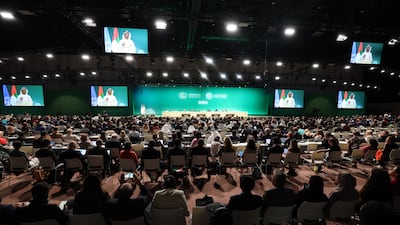Live updates: Follow the latest news on Cop28
A historic deal on paying for climate disasters was welcomed on day one of Cop28 as an early win that sets a tone of “goodwill and trust” for the talks in the UAE.
The world was urged to “channel this momentum” through the rest of the two-week summit, after the breakthrough on the funding issue only hours after Cop28 opened.
Negotiators applauded after the compromise deal on paying for climate-related “loss and damage”, hammered out in the run-up to the summit, was adopted without further debate in Dubai.
Sharing their thoughts with The National, the consensus view from campaigners was that a deal was welcome after long negotiations but that the summit's work was "far from over" – with some issues still outstanding on loss and damage and attention now turning to other topics such as fossil fuels.
The early compromise was important because “we need the space in this Cop to do the other very pressing things”, said Rachel Cleetus, a lobbyist for the Union of Concerned Scientists campaigning for funding for countries in need.
Although she described the deal between rich and developing countries as “far from perfect”, she said it marked a “significant step forward” on what for years has been a point of contention in climate talks.
“This can help build that base of goodwill and trust to deliver on those other very important pieces too,” Ms Cleetus said.
Also greeted with satisfaction was the formal adoption of an agenda for Cop28 – no certainty after a stalemate during preliminary talks in Bonn, Germany, over the summer, when it took nearly two weeks to agree a basis for that meeting.
“Our success in launching our work without delay sends an important message of commitment, dedication and determination to commence our important and urgent work,” said Cop28 President Dr Sultan Al Jaber.
Dr Al Jaber, also the UAE’s Minister of Industry and Advanced Technology, called the loss and damage deal a “historic decision” that “sends a positive signal of momentum to the world and to our work here in Dubai”.
US negotiator John Kerry called the early deal a “great way to start this Cop", while British delegate Alison Campbell called on delegates to "channel this momentum through the rest of Cop28 as we strive for an ambitious outcome”.

‘Still a way to go’
Loss and damage refers to climate effects that are already happening or are inevitable, such as rising sea levels that threaten to submerge small island nations.
Countries agreed on the principle of a loss and damage fund at Cop27 in Egypt last year, but left several questions open, such as who would pay and who would oversee the payments.
The deal in Dubai means the fund can now come into operation with some of those questions answered – governments of rich countries are told to “take the lead” in funding, and the World Bank is envisaged as an initial host.
A common view from campaigners was that the united front was highly welcome after long negotiations – but that developed countries now need to make their intentions clear.
Cop28 begins at Expo City Dubai - in pictures
Activists expect rich countries to start doing that at Cop28 by pledging money to the fund. The UAE immediately offered $100 million, while the UK put in £60 million ($75 million).
“After 30 years of effort from developing countries and civil society, it is nothing short of momentous to see the loss and damage fund agreed upon today,” said Heather McGray, director of the Climate Justice Resilience Fund.
“It is now essential that developed countries take immediate action to fill the fund with money that is new and additional – not redirected from existing climate finance or development aid.”
Negotiators from the Alliance of Small Island States – who had lobbied hard for funding from rich countries – said they welcomed the “rapid adoption” of the text.
But “the work is far from over. After the gavel drops at Cop28, we cannot rest until this fund is adequately financed and starts to actually alleviate the burden of vulnerable communities”.
Attention turns to stocktake
The stakes are high for the rest of Cop28, as countries discuss how to limit climate change in the first place so that loss and damage is never needed.
Next to the loss and damage fund, the other key agenda item in Dubai is the first “global stocktake” of how the world is doing in meeting the Paris Agreement goal of slowing global warming to 1.5°C above pre-industrial levels.
Discussions on the stocktake, which countries are expected to take account of when they draw up national green policies, will begin on Friday.

The central verdict – that the world is not yet doing enough – is already clear, but there is likely to be lively debate on issues such as energy and fossil fuels. The tone, though, was hopeful.
Dr Al Jaber said the loss and damage deal “sets a clear ambition for us to agree a comprehensive, ambitious GST [global stocktake] decision over the next 12 days”.
Hailey Campbell, a campaigner from Care about Climate, which is calling for an urgent end to fossil fuels, was also among those cheered by the prospects after day one of Cop28.
“If we can deliver on loss and damage, I am hopeful we can deliver on a fossil fuel phase-out; we need to safeguard our future faster than what parties may feel is possible entering this Cop,” she said.












